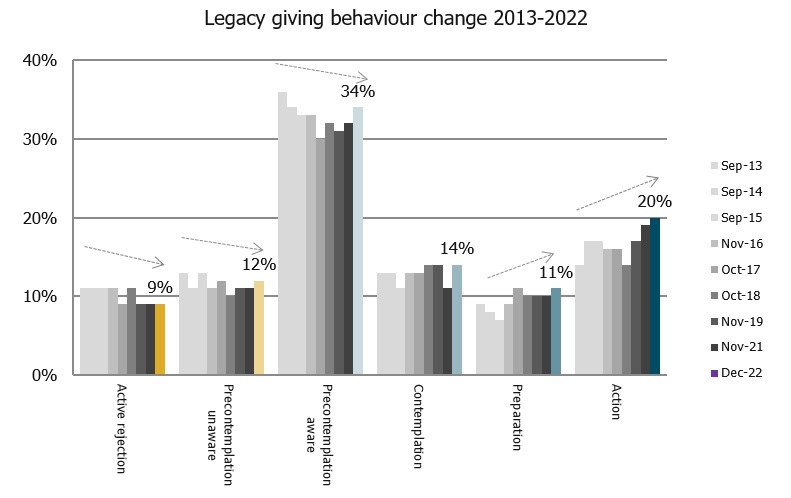Legacy giving up 43% in a decade

Legacy giving has risen by 43% over the past decade according to a new study from Remember A Charity.
20% of UK charity supporters aged 40+ now say they have left a charitable gift in their Will compared with 14% in 2013. The study charts a steady rise in the proportion of people choosing to give from their Will over time.

The Remember A Charity consumer benchmarking study, carried out by independent research firm OKO, surveys more than 2,000 charity donors aged 40+ to track legacy giving attitudes and behaviour year-on-year.
Advertisement
The 2022 study released today found that:
- One in five supporters said they had included a charity in their Will (20%)
- Just over one in 10 said they are preparing to do so (11%)
- Fewer than one in 10 reject the concept altogether (9%).
The tracking study follows Prochaska’s Stages of Change model (which shows that people move through a series of stages when modifying or changing behaviour), and shows forward movement over the years from donors’ rejection and lack of awareness through to awareness, contemplation, preparation, and action (leaving a gift).
Lucinda Frostick, Remember A Charity Director said:
“This continued growth in appetite for legacy giving is hugely encouraging and reflects the sector’s increased focus on fundraising for gifts in Wills over the past 10 years and more. It may take years – in some cases decades – for donations to filter through, but that income will be crucial in funding charitable services for generations to come.”
Just under two thirds of people surveyed (63%) had already written a Will, with three in 10 of those having included a charitable donation (29%). Despite the economic climate, the large majority of all respondents (80%) said they were just as likely to leave a legacy as 12 months earlier, with twice as many people (14%) saying they were more likely to give than those saying they were less likely (6%).
Of all those who have pledged a gift in their Will, more than six in 10 (62%) haven’t let the charities know about their gift. Asked why that is, the most common reasons respondents gave were that it hadn’t occurred to them to tell the charity (46%) and that they couldn’t see how it would help the charity to know (30%).
Frostick added:
“Knowing who has pledged a gift enables charities not only to budget for the future, but to thank supporters, understand more about their legacy motivations and tailor their communications to enhance the donor experience. This may well include avoiding making repeat legacy gift asks. Our research suggests that there’s a need for charities to articulate this message to supporters more clearly, encouraging those who have left a gift to let them know and making it easy to do so.”
The research also shows that those who are familiar with Remember A Charity are almost twice as likely to have left a gift in their Will – 32% compared to 17%.



